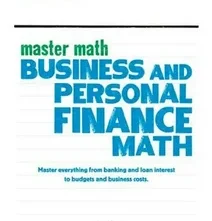Mathematics is a subject that may conjure memories of school exams and complex equations, but its applications extend far beyond the classroom. Mathematics for Business and Personal Finance.
In business and personal finance, understanding and applying mathematical concepts is crucial for making informed decisions and achieving financial success.
Let’s look at the importance of mathematics in business and personal finance and highlight some key areas where it plays a pivotal role.
The Role of Mathematics in Business
Mathematics has always been a fundamental tool in the business world. From calculating profits and losses to analyzing market trends, businesses rely on mathematics to make informed decisions and drive growth.
One of the critical areas where mathematics is indispensable is financial analysis. By applying mathematical concepts such as ratios, percentages, and equations, businesses can gain valuable insights into their financial performance.
For example, financial ratios like the debt-to-equity ratio can help assess a company’s financial health and ability to meet its debt obligations.
These ratios offer a numerical approach to assess financial performance, allowing businesses to pinpoint areas for enhancement and formulate strategic decisions accordingly.
In addition to financial analysis, mathematics also plays a crucial role in operations management. By using mathematical models, businesses can optimize their resources and improve efficiency.
For example, linear programming can be applied to ascertain the most efficient allocation of resources, such as labor and materials, in order to maximize output while minimizing costs.
This mathematical approach allows businesses to minimize costs while maximizing productivity, leading to improved profitability and competitiveness.
Mathematics also enables businesses to make accurate sales forecasts and predictions. By looking at historical data and applying statistical models, companies can estimate future demand for their products or services.
This information is invaluable for inventory management, production planning, and overall business strategy. Moreover, mathematical tools like regression analysis can help identify the factors that influence sales and customers and improve customer satisfaction.
In summary, mathematics provides businesses with analytically optimized resources and drives growth. By harnessing the power of numbers, companies can
How Mathematics Can Improve Personal Finance
Mathematics is not just for businesses; it also significantly impacts personal finance. Whether managing your household budget or planning for retirement, understanding and applying mathematical concepts
One area where mathematics is particularly relevant in personal finance is budgeting. By having a budget, you can track your income and expenses, know areas where you can save money, and plan for future costs.
Mathematics can help you analyze your spending patterns and make informed choices about how to allocate your resources.
For example, by using mathematical principles like percentages, you can determine how much of your income should be given to different expense categories, such as housing, transportation, and savings.
It allows you to prioritize your spending and ensure that you’re living within your means. Another area where mathematics is crucial in personal finance is investing.
Whether you’re investing in stocks, bonds, or real estate, understanding mathematical concepts like risk and return is essential for making informed investment decisions.
Mathematics allows you to calculate the expected return on investment, assess the level of risk involved, and determine the optimal asset allocation for your investment portfolio.
By applying mathematical models, such as the Capital Asset Pricing Model (CAPM) or the Modern Portfolio Theory (MPT), you can build a diversified portfolio that balances risk and return.
The Significance of Mathematics in Both Business And Personal Finance
Financial Planning
Effective financial planning is the cornerstone of any successful business or personal finance strategy. Mathematics provides the necessary tools and techniques to analyze income, expenses, investments, and debts.
By utilizing mathematical concepts such as budgeting, forecasting, and risk assessment, individuals and businesses can develop robust financial plans that align with their goals and objectives.
Through careful calculations and projections, mathematical models can help identify potential pitfalls and opportunities, enabling proactive decision-making.
Profitability Analysis
For businesses, understanding profitability is crucial for sustainable growth. Mathematics allows companies to calculate profit margins, break-even points, and return on investment (ROI). These calculations provide:
- Valuable insights into a company’s financial health.
- Helping owners and managers make informed pricing decisions.
- Cost management.
- Resource allocation.
By leveraging mathematical techniques, companies can optimize their operations and maximize profitability.
Time Value of Money
The concept of the time value of money is fundamental in business and personal finance. It recognizes that money today holds more value than the same amount in the future due to factors such as inflation and opportunity costs.
Mathematics offers various formulas, such as present value and future value calculations, to evaluate the worth of money over time.
Understanding these concepts enables individuals and businesses to make sound investment decisions and assess the long-term financial impact of their choices.
Risk Management
Risk is an inherent aspect of both business and personal finance. Mathematics provides valuable tools and methodologies to assess and manage risk effectively.
Concepts such as probability, statistical analysis, and Monte Carlo simulations help individuals and businesses quantify and evaluate risks associated with investments, loans, and financial transactions.
By utilizing mathematical models, decision-makers can identify potential risks, develop risk mitigation strategies, and make informed choices that align with their risk tolerance level.
Data Analysis and Interpretation
In today’s data-driven world, the ability to analyze and interpret financial data is crucial for making informed decisions.
Mathematics equips individuals and businesses with the necessary skills to analyze complex financial data sets, identify patterns, and draw meaningful conclusions.
Regression analysis, correlation analysis, and data visualization enable stakeholders to gain valuable insights into market trends, consumer behavior, and financial performance.
By leveraging these mathematical tools, businesses can make data-backed decisions, minimize risks, and capitalize on emerging opportunities.
Interest Rates and Investments
In the world of finance, interest rates are fundamental. Whether you’re securing a loan, establishing a savings account, or delving into stock market investments, a fundamental comprehension of interest rates is indispensable.
Concepts like compound interest, present value, and future value calculations are crucial when evaluating different investment options.
With mathematical formulas, individuals can assess potential returns, weigh risks, and make informed decisions to grow their wealth.
Mortgages and Loans
Purchasing a home or financing a significant purchase involves taking out loans.
Understanding the mathematical implications of loans, including the interest rate, loan term, and repayment schedule, allows individuals to select the most suitable loan option for their financial situation.
This knowledge empowers borrowers to manage debt responsibly and avoid potential financial pitfalls.
Taxation and Deductions
Taxes are an inevitable part of personal finance and business operations. Employing mathematics to comprehend tax brackets, deductions, and credits helps individuals and businesses optimize their tax strategies.
By doing so, they can reduce their tax liability and retain more of their hard-earned money.
Profit and Loss Analysis
For entrepreneurs and business owners, a firm grasp of mathematical concepts is vital in understanding profit and loss statements. Analyzing revenue, expenses, and profit margins allows businesses to identify areas of inefficiency, maximize profits,
Risk Assessment and Insurance
Life is unpredictable, and risk assessment is essential for safeguarding one’s financial well-being. Whether it’s health insurance, property insurance, or other forms of coverage, using mathematical models to analyze risk and probabilities helps individuals determine the level of coverage they need.
It enables them to adequately protect themselves and their assets without overpaying for unnecessary coverage.
Conclusion
In both the business and personal finance world, mathematics is a powerful tool that empowers individuals to make informed decisions and achieve financial security from basic budgeting to complex investment strategies and mathematics financial management.
Embracing its principles can lead to better economic outcomes, reduced stress, and a more straightforward path to reaching long-term financial goals.
So, whether you are managing your finances or running a business, always appreciate the value of mathematics in unlocking the power of numbers.
Next Article:






